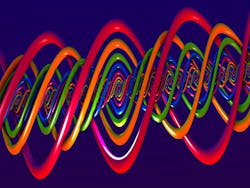In an effort to help stop the spread of COVID-19, a team of researchers is trying to block a key enzyme in the human cell that the virus needs to thrive.
Biochemist Yuk-Ching Tse-Dinh, director of the Biomolecular Sciences Institute at Florida International University in Miami, FL, and the center's associate director Prem Chapagain have teamed up with researchers at the University of Texas Medical Branch (UTMB) at Galveston and National Cancer Institute. The team is searching for potential treatment leads, hoping at least one of them will reduce the spread of the virus in infected individuals. Currently, there are no evidence-based treatments for COVID-19 or any other coronaviruses.
Last month, Dr. Mariano Garcia-Blanco from UTMB reported in BioRxiv his discovery that coronaviruses rely on the enzyme Topoisomerase III-ß (TOP3B) as a host factor. Normally, topoisomerases aid in DNA replication within human cells. But when certain viruses, including Dengue, Zika and COVID-19, latch on to TOP3B, they use the enzyme to help assemble new copies of the virus, turning infected cells into virus factories.
Upon this discovery, Garcia-Blanco enlisted the help of Tse-Dinh, an internationally known expert in topoisomerases, to start screening for a drug that could block the enzyme and prevent COVID-19 from multiplying in high numbers in a person's body.
"We approached FIU as a place where the best inhibitors can come from," Garcia-Blanco said.
Tse-Dinh is starting with drugs already approved by the Food and Drug Administration because she is looking for a treatment that can be tested quickly on patients. "We are targeting a host factor, something already in the human cell that the virus is hijacking," Tse-Dinh said. "If the cell's TOP3B is not working, the virus would not do so well."
The researchers believe antiviral medications could be administered in tandem with a TOP3B inhibitor to deliver a double blow to the virus and improve chances of recovery for those who are critically ill.
"Our researchers are focused on real, tangible solutions for the greatest challenges of our time," said Mike Heithaus, dean of FIU's College of Arts, Sciences & Education. "This effort, if successful, has potential beyond the current pandemic. It could provide a new approach to treating other viruses and even emerging ones."
But with thousands of FDA-approved drugs, knowing where to begin is a real challenge. That's where Chapagain comes in.
Using artificial intelligence and molecular modeling, the physicist was able to quickly identify top drug candidates that could possibly serve as TOP3B inhibitors. Tse-Dinh and Ph.D. students Ahmed Seddek and Tumpa Dasgupta have been testing those drugs against a purified version of TOP3B and related topoisomerases. Tse-Dinh is referring drugs that show potential to Garcia-Blanco's team who is now testing them against live cell cultures and viruses including COVID-19.
"It's a very simple story," Garcia-Blanco said. "We want to inhibit this enzyme. That's it. If we can do that and combine it with other anti-viral treatment, it could enhance the chances to help people who are very ill."

